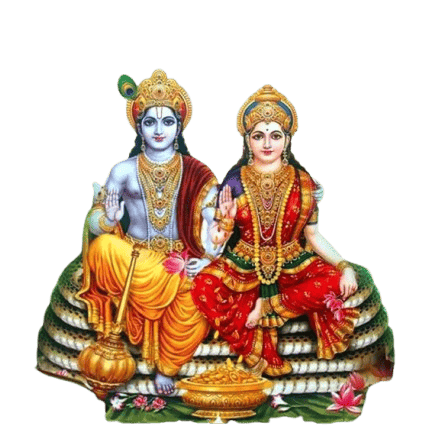
Vishnu Puja performed on Vaikuntha Ekadashi is a highly significant and auspicious Hindu ritual dedicated to Lord Vishnu, the preserver and protector of the universe. Vaikuntha Ekadashi falls on the 11th day (Ekadashi) of the Shukla Paksha (bright fortnight) in the month of Dhanurmas (December–January), and is considered one of the most sacred days in the Hindu calendar. It is believed that on this day, the gates of Vaikuntha, the divine abode of Lord Vishnu, are opened, and devotees who observe the fast and worship Lord Vishnu with sincerity are blessed with moksha (liberation from the cycle of birth and death).
Devotees perform this puja to seek Lord Vishnu’s blessings for happiness, prosperity, protection, and spiritual upliftment. On this day, fasting, chanting, and devotion to Lord Vishnu are central to the worship.
The puja begins with cleaning the house and setting up an altar. A statue or image of Lord Vishnu is placed on the altar, often depicted in a reclining position on the Shesha Naga (divine serpent), or seated on a lotus. The altar is decorated with flowers, fruits, kumkum, and sandalwood paste to create a sacred atmosphere.
Devotees begin their worship by offering water, milk, honey, tulsi leaves (which are highly sacred to Lord Vishnu), and ghee to Lord Vishnu. The Vishnu Ashtakshara Mantra (“Om Namo Bhagavate Vasudevaya”) is chanted repeatedly, along with Bhagavad Gita recitations or Vishnu Stotra. Some devotees may also perform abhishekam (ritual bathing) of Lord Vishnu’s idol with milk, ghee, honey, and water.
Fasting and meditative chanting of Hare Krishna Mantra or Om Namo Narayanaya are also key practices during this day. Devotees stay awake during the night, engaging in bhajans, kirtans, and prayers to honor Lord Vishnu.
The puja concludes with Aarti and the distribution of prasadam to family members and guests. Observing this day with devotion is believed to cleanse the mind, purify the soul, and bring spiritual blessings.

